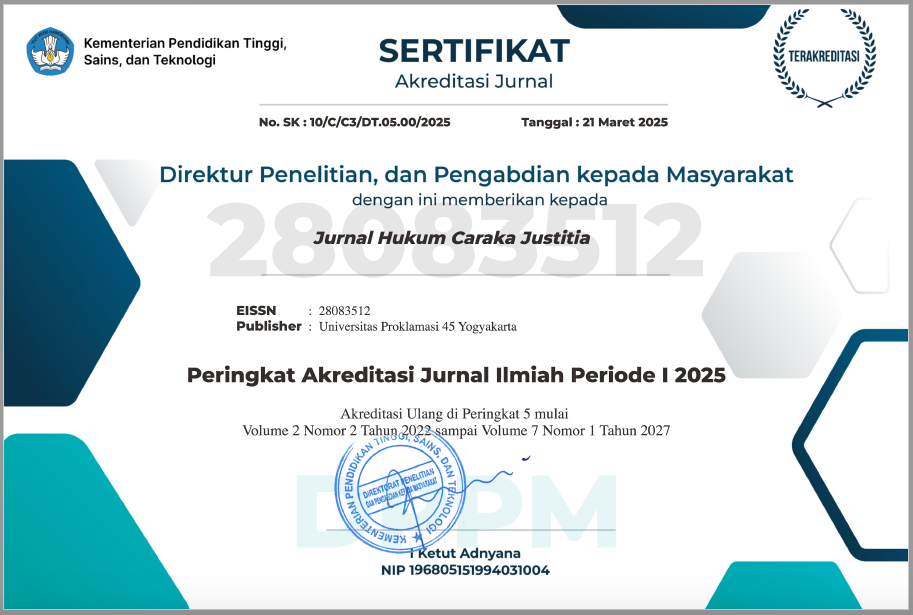Perlindungan Hukum Bagi Konsumen dalam Sengketa dengan Pelaku Usaha Pengembang Perumahan
DOI:
https://doi.org/10.30588/jhcj.v2i2.1282Keywords:
Legal Protection, Consumer Disputes, Business Actors, Housing Developers.Abstract
The purpose of this study is to find out and examine why the form of legal protection for consumers in disputes with housing developers is still not optimal. The approach method used is normative juridical. This approach is intended to be a type of dogmatic research and a form of descriptive research concerning laws. Furthermore, the specification of this research is descriptive-analytical, namely by providing an overview of the problems raised and providing an analysis of the problem to be able to provide answers to these problems. Methods of data collection using library research that is testing the document materials and library materials used in this study. The data were analyzed qualitatively normative, namely conducting research by interpreting and constructing statements contained in statutory regulations. The thesis statement is that the Consumer Protection Act in the implementation of the protection of consumer rights has not been fully realized, mainly related to behavior to fight for rights, such as advocacy rights and the right to obtain compensation. The obstacles to implementation are related to factors that are not known in detail about the rights and obligations of the consumers. So housing consumer protection in the Consumer Protection Act had not played a role as expected when it was enacted, namely providing legal protection for consumer rights. This can be seen from the many violations related to buying and selling houses, where the parties who are greatly disadvantaged here are the housing consumers. Government control is still weak on business actors in the housing industry or developers, only limited to licensing alone, while regarding the interaction or direct relationship between developers and consumers, the government does not intervene.
References
Buku
Budiharjo. Sejumlah Masalah Permukiman. Bandung: Alumni, 1992.
Nasution, A Z. Konsumen dan Hukum. Jakarta: Pustaka Sinar Harapan, 1995.
Nurmandjito. Kesiapan Perangkat Perundang-undangan Tentang Perlindungan Konsumen. Bandung: Mandar Maju, 2000.
Shidarta. Hukum Perlindungan Indonesia. Jakarta: Grasindo, 2000.
Shofie, Yusuf. Perlindungan Konsumen dan Instrumen Hukumnya. Bandung: Citra Aditya Bakti, 2000.
Shofie, Yusuf. Perlindungan Konsumen. Bandung: Citra Aditya Bakti, 2003.
Siahaan, NHT. Perlindungan Konsumen dan Tanggung Jawab Produk. Jakarta: Panta Rei, 2005.
Sulistyowati. Akses Kepada Perlindungan Konsumen Sebagai Salah Satu Aspek Kesejahteraan Sosial. Jakarta: UI, 1992.
Widijantoro. J., Sari Murti Widiyastuti, & Th. Agung M. Harsiwi. Pemetaan Masalah Perlindungan Konsumen dalam Perspektif Konsumen dan Pelaku Usaha. Yogyakarta: Cahaya Atma Pustaka, 2020.
Zein, M. Patra. Hak Rakyat Atas Perumahan. Bandung: Citra Aditya Bakti 2004.
Tesis
Darwis, Abdi. “Hak Konsumen untuk Mendapatkan Perlindungan Hukum dalam Industri di Kota Tangerang”. Tesis Program Pascasarjana Magister Kenotariatan, Universitas Diponegoro, 2010.
Internet
Badan Perlindungan Konsumen Nasional (BPKN). “Tugas dan Fungsi BPKN”. https://bpkn.go.id/page/tugas-dan-fungsi (diakses 30 Oktober 2022).
Peraturan Perundang-Undangan
Undang-Undang Dasar Republik Indonesia 1945 Pasca Amandemen.
Undang-Undang Nomor 5 tahun 1999 tentang Larangan Praktik Monopoli dan Persaingan Usaha-Usaha Tidak Sehat.
Undang-Undang Nomor 8 Tahun 1999 tentang Perlindungan Konsumen.
Undang-Undang Nomor 30 Tahun 1999 tentang Arbritase dan Alternatif Penyelesaian Sengketa.
Peraturan Pemerintah Nomor 58 Tahun 2001 tentang Pembinaan
Pengawasan dan Penyelenggaraan Perlindungan Konsumen.
Keputusan Menteri Perumahan Rakyat Nomor 06/KPTS/1994 tentang Pembangunan Perumahan Kelompok.
Keputusan Menteri Perumahan Rakyat Nomor 09/KPTS/M/1995 tentang Pedoman Pengikatan Jual Beli Rumah.
Surat Edaran Dirjen Perdagangan Dalam Negeri Nomor 235/DJPDN/VII/2001 tentang Penanganan pengaduan konsumen yang ditujukan kepada Seluruh dinas Indag Prop/Kab/Kota.
Surat Edaran Direktur Jenderal Perdagangan Dalam Negeri Nomor 795/DJPDN/SE/12/2005 tentang Pedoman Pelayanan Pengaduan Konsumen.
Downloads
Published
How to Cite
Issue
Section
License
Copyright (c) 2023 Sigit Wibowo

This work is licensed under a Creative Commons Attribution 4.0 International License.
Authors who publish with JHCJ agree to the following terms:
Authors retain copyright and grant the JHCJ right of first publication with the work simultaneously licensed under a Creative Commons Attribution 4.0 International License that allows others to share (copy and redistribute the material in any medium or format) and adapt (remix, transform, and build upon the material) the work for any purpose, even commercially with an acknowledgment of the work's authorship and initial publication in JHCJ.
Authors are able to enter into separate, additional contractual arrangements for the non-exclusive distribution of the journal's published version of the work (e.g., post it to an institutional repository or publish it in a book), with an acknowledgment of its initial publication in JHCJ. Authors are permitted and encouraged to post their work online (e.g., in institutional repositories or on their website) prior to and during the submission process, as it can lead to productive exchanges, as well as earlier and greater citation of published work (See The Effect of Open Access).














